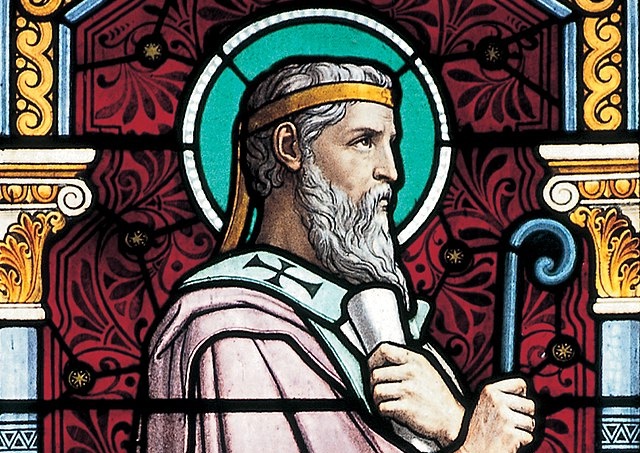
The early Church Fathers are a hinge in Christian history; they illustrate for us a strong continuity between the Church of the Scriptures, the Church of the first centuries, and the Church of the present day.
One of the clearest examples of that continuity is St. Irenaeus of Lyons, whose feast day is June 28th. Irenaeus hailed from Smyrna, the home of St. Polycarp, who learned the faith at the feet of St. John the Apostle.
As he testifies in Against Heresies:
“Polycarp also was not only instructed by the apostles, and conversed with many who had seen Christ, but was also by the apostles in Asia appointed bishop of the Church in Smyrna, whom I also saw in my early youth, for he tarried on earth a very long time…having always taught the things which he had learned from the apostles, and which the Church has handed down…” (Against Heresies 3:3)
This proximity to the Beloved Disciple alone ought to make the writings of Irenaeus worth considering, but their content is also extraordinary, due to the picture it gives us of 2nd century Christianity, and how it was guarding and passing on the faith of the apostles.
Regarding the authority of Sacred Tradition in the life of the Church, St. Irenaeus says this:
“(I)t is not necessary to seek the truth among others which it is easy to obtain from the Church; since the apostles, like a rich man [depositing his money] in a bank, lodged in her hands most copiously all things pertaining to the truth: so that every man, whosoever will, can draw from her the water of life.” (Against Heresies 3,4:1)
Elsewhere in Against Heresies, he speaks of the “tradition derived from the apostles, of the very great, the very ancient, and universally known Church founded and organized at Rome by the two most glorious apostles, Peter and Paul…” and goes on to say that “it is a matter of necessity that every Church should agree with this Church, on account of its preeminent authority…” (Against Heresies 3,3:2).
St. Irenaeus also articulates a view of the Eucharist consistent with historic Catholic teaching, a doctrine which he learned from those who were taught by the apostles:
“He has declared the cup, a part of creation, to be his own blood, from which he causes our blood to flow; and thebread, a part of creation, he has established as his own body, from which he gives increase unto our bodies.” (Against Heresies 5:2)
Interestingly enough, in Against Heresies, St. Irenaeus sets his sights on disproving the claims of the Gnostics, who early on began to lead Christians astray by pitting matter against spirit, denying the incarnation, and professing the true Gospel to be a kind of secret knowledge. His rebuttal:
“(T)he doctrine of the apostles is open and steadfast, holding nothing in reserve; nor did they teach one set of doctrines in private, and another in public… for error is plausible, and bears a resemblance to the truth, but requires to be disguised; while truth is without disguise, and therefore has been entrusted to children.” (Against Heresies 3,15:1-2)
It should be noted that combatting Gnosticism was also a hallmark of the writings of John, in his Gospel, and especially in his first epistle. John, who mentored Polycarp, who mentored Irenaeus. The apple does not fall far from the apostolic tree.
It is also fitting that it was Pope Francis who eventually declared Irenaeus to be a Doctor of the Church only a few years ago. Francis had long treasured a devotion to Mary under the title “Undoer of Knots,” a title which has its roots in the writings of St. Irenaeus around 189 A.D.:
“In accordance with this design, Mary the Virgin is found obedient, saying, “Behold the handmaid of the Lord; be it unto me according to your word.” But Eve was disobedient; for she did not obey when as yet she was a virgin… And thus also it was that the knot of Eve’s disobedience was loosed by the obedience of Mary. For what the virgin Eve had bound fast through unbelief, this did the virgin Mary set free through faith.” (Against Heresies 4,22:4)
For anyone exploring the ancient roots of our Church, St. Irenaeus is an indispensable resource. His voice rings out among the great cloud of witnesses who carefully guarded and passed down the faith of the first Christians, who still had the voices of the Apostles echoing in their hearts.
St. Irenaeus of Lyons, pray for us!






